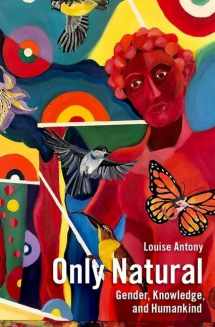
Only Natural: Gender, Knowledge, and Humankind
Book details
Summary
Description
Review
"In Only Natural, Antony's tremendous philosophical insight illuminates a wide range of phenomena DS some woefully neglected DS that feminists of all stripes and disciplines should take seriously. Her tightly argued views draw on her expertise in philosophy of mind and epistemology and demonstrate the tremendous value of feminist work for a wide range of areas. Some of the essays have already had a major impact, and the newer ones surely will. It is essential reading for anyone interested in feminist theory." -- Sally Haslanger, Massachusetts Institute of Technology
"The breadth of this collection is staggering: epistemology, metaphysics, philosophy of mind and language, moral and political theory, and the concept of human nature. But the underlying questions always concern the relationship between feminism and analytic philosophy. Antony argues that analytic philosophy has much to learn from feminism and, perhaps more surprisingly, that analytic philosophy has much to offer to feminism, a case she makes mostly through her own example. The discussion is shaped throughout by Antony's characteristic rigor, insight, wit, and humor, which makes it not just rewarding to read but enjoyable as well." -- Richard Kimberly Heck, Brown University
"Louise Antony is a towering figure in feminist philosophy, one of the founders of analytic feminism. The release of this volume, then, is a milestone event for feminist philosophy. Antony's work shows that it's possible to combine views that others thought utterly incompatible-- like feminism and individualism, or feminism and nativism. Her vision of feminist philosophy is a unique and necessary one, posing vital and important challenges to deeply held beliefs on all sides. Everyone should read this." -- Jennifer M. Saul, The University of Sheffield
This volume showcases the work of philosopher Louise Antony, and her influential contributions to feminist and analytic philosophy, epistemology, and the philosophy of mind. Her broadly interdisciplinary work brings a naturalistic perspective to philosophical issues of both theoretical and practical importance and center on a key theme--whether, and how, facts about human embodiment ought to constrain philosophical theories.
Antony argues that feminist criticisms of analytic epistemology have brought to light some serious limitations of mainstream approaches to the theory of knowledge, and that a naturalistic approach to epistemology is called for. In Part One of this volume, she considers the relationship between feminism and analytic philosophy of mind and language, with special attention to "speech act" theories of pornography. In Part Two, she defends naturalized epistemology both as a correct approach to the study of human knowledge, and as a useful tool for progressive activists in the struggle for social justice. And in Part Three, she confronts nature-nurture debates, particularly as these erupt in debates about gender and racial equality. Throughout the volume, she makes the case for a philosophical method informed by empirical science.
Collecting these articles alongside a new introduction reveal the underlying unity and impressive power of Antony's work over several decades. Groundbreaking at the time of their publication, and more relevant today, this collection will be of interest to a wide range of philosophical readers.


We would LOVE it if you could help us and other readers by reviewing the book
Book review



